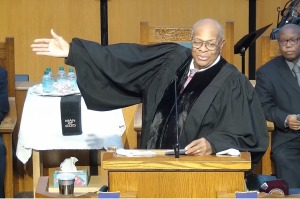The Size of God Should Determine the Size of Your Ministry Goals
The Apostle Paul didn't have a cell phone or the Internet, yet he took the Gospel into the long-reaching corners of the Roman Empire.
Here are the reasons for his S-U-C-C-E-S-S --
* S -- Sense of direction
* U -- Understanding
* C -- Commitment
* C - Compassion
* E -- Enthusiastic faith
* S -- Service to others
* S -- Staying power
S - Sense of Direction
If you don't know where you're headed, you'll probably end up somewhere else. Paul had a crystal clear purpose. In Romans 15:20, Paul writes, "It has always been my ambition to preach the gospel where Christ was not known, so that I would not be building on someone else's foundation." (NIV) I've always loved this verse. Like Paul, I've always seen myself as a spiritual entrepreneur. Paul was a pioneer. He didn't want to lead an existing church. He wanted to start something new. But the point isn't what kind of ministry God had called him to; it's that he knew what that ministry was.
Most people don't succeed because they don't really know what they want. They do something for a few years, then switch and do something else, then switch again. Finally, they get to 40, 50, or 60 years old, and they've done 10 different things. They've never focused their lives on anything specific.
We should always be able to answer this question immediately: "What has God called you to do?"
When you figure out the "why" in life, God will show you the "how." When I started Saddleback Church, I didn't know how God was going to do it. But I knew why and I knew what. I had the message and the motive, and God came up with the method.
Ministry success starts by understanding what God wants you to do.
U - Understanding
In Philippians 4:12, Paul says, "I know what it is to be in need, and I know what it is to have plenty. I have learned the secret of being content in any and every situation ...." (NIV) Contentment must be learned - and it's a tough lesson.
It might seem like a contradiction to say that you need to have a goal and you need to be content. But it's not. Contentment isn't the absence of a goal. It's being happy with where you are as you work toward your goal. If you think you won't be happy until you've reached your goal, you'll never be happy.
There's always a tension in ministry between the real and the ideal. You need to keep the ideal in your mind, but you must live with the real and not be frustrated by it. No matter how good things get in your church, it shouldn't ever be where you want it to be. We always must keep striving, keep moving, and keep progressing.
In 2 Thessalonians 3:5, Paul says, "May the Lord lead you into a greater understanding of God's love and the endurance that is given by Christ." (GNB) Endurance and understanding go together. When people quit before the job is finished, it shows a lack of understanding - or perspective. They don't have the big picture about their ministry and just get caught up in the details.
When you understand the problem, you can endure it far longer than when you don't understand it. Where do you get the kind of understanding that helps you last in ministry? You get it from God's Word (Psalm 119:105). Fill you mind with God's Word, and it'll make you wise.
C - Commitment
In Acts 20:24, The Apostle Paul says, "But my life is worth nothing to me unless I use it for finishing the work assigned me by the Lord Jesus-the work of telling others the Good News about the wonderful grace of God." (NLT) Paul knew what he was committed to and he held nothing back.
Jesus said it like this, "Count the cost. No man can follow me unless he takes up his cross, denies himself and follows me." This is what I think that means: Don't be a wishy-washy, wimpy servant of God. Make a total commitment of your life. We should, once and for all, make a commitment to serve what really matters and be willing to pay any price in our service for Jesus.
C- Compassion: 1 Corinthians 13:2-3 says, "I may have all knowledge and the faith to move mountains. I may give away everything I have but if I have not love it does me no good." (GNB) Without love in your life, nothing else matters. In Matthew 22 Jesus says it's our first responsibility.
Ministry is simply loving others in a practical way.
We know that love is choice. It's the commitment to care for someone else. If you want to be successful in ministry, you have to commit to loving people. Paul gives us this secret to ministry success in Colossians 3:12b. He writes, "Clothe yourself with compassion." (NIV) That's Paul's method of dressing for success!
What does compassion mean? It means being sensitive to the needs of others, but it means more - much more -- than that. It means doing something about those needs you see. Sympathy is saying, "I'm sorry you hurt." Empathy is, "I hurt with you." But compassion is, "I'll do anything I can to stop your hurt." Repeatedly, the Bible says that Jesus was moved with compassion. He said, "I'll do anything to stop your hurt -- even if it means dying on the cross."
E - Enthusiastic faith: Paul says in Romans 8:31b, "If God be for us, who can be against us." (NIV) One of the reasons I love Paul so much is that he's an eternal optimist. He's getting beat up, shipwrecked, thrown in prison, stoned, and yet he stays positive. He wouldn't give up because he had an enthusiastic faith. He attempted great things for God, and he expected great things from God. If you're going to be successful in ministry, you've got to have an enthusiastic faith. You've got to have hope.
Paul believed that no situation was hopeless. Philippians 4:13 says, "I'm ready for anything." (Phillips) I don't know if I'd dare say that, but Paul did. His faith kept him going. Nothing great is ever accomplished without enthusiasm. Jesus said it like this: "Everything is possible for the person who believes." (Mark 9:23b NLT)
People used to say, "It's impossible for a church to buy 70 acres in Orange County." They laughed at me! When I said in the first service of the church, "Someday we're going to have at least 50 acres," people said, "Who do you think we are?" Wrong question! The right question is "Who do I think God is?"
Let the size of your God determine the size of your goal.
S - Service to others: If you're going to be effective in ministry, you must serve other people. 2 Corinthians 8:19 says, "We carry out the service of love for the Lord's glory and to show that we want to help." (GNB) Paul's favorite title to use for himself is "I'm a servant of the Lord."
There is absolutely no such thing, in the church or in the world, as success without service.
Success without services is a false, phony success. It's just an image. Meet the needs of other people. That's how you find success in any field - including ministry. The Apostle Paul said, "I will be glad to spend all I have, and myself as well, in order to help you." (2 Corinthians 12:15 GNB) Those words come from a servant heart.
S - Staying power: Ministry requires the refusal to give up. If you give up at the first sign of trouble, you'll never get anywhere in ministry. Trouble is always around the corner. Paul writes in 2 Corinthians 4:8-9, "We're pressured on every side but we're not crushed. We're perplexed but we're not in despair. We're persecuted but we're not abandoned. We're stuck down but we're not destroyed." Paul never says it would be easy to serve the Lord. It's not. But he tells us not to give up.
A good example of this is Acts 14. Paul goes in and preaches in a town. They didn't like what he said, and they stoned him. Then he was left for dead outside the edge of town. But do you remember what he does then? He gets up, goes to the next town, and starts preaching again! He didn't say, "I got burned in a church. I'll never serve again. Nobody appreciates my ministry. I'll just give up." He got up, went to the next town, and did the exact same thing.
You can't change the destination of your ministry instantly. But you can change the direction instantly. You may have just gotten a little off track. That can change today. Applying the seven principles of S-U-C-C-E-S-S is a good place to start to make those changes.





























